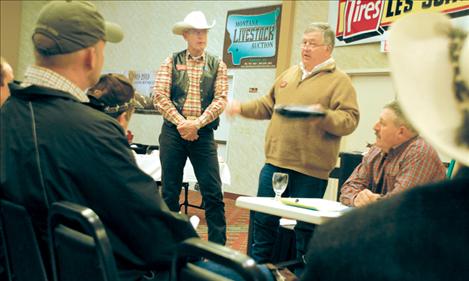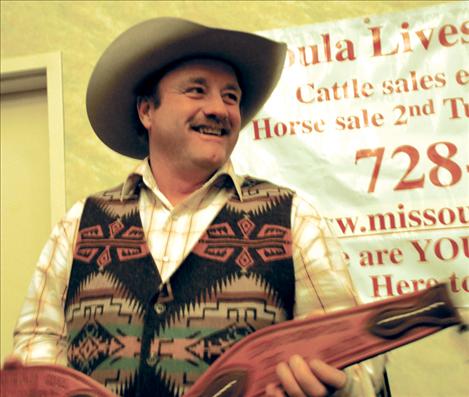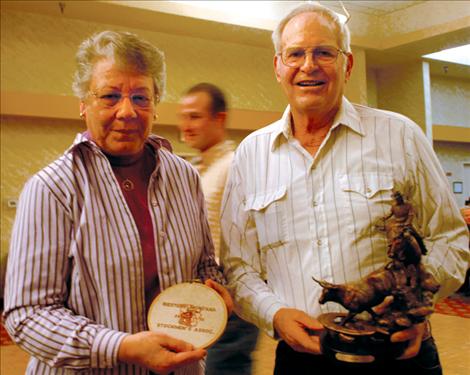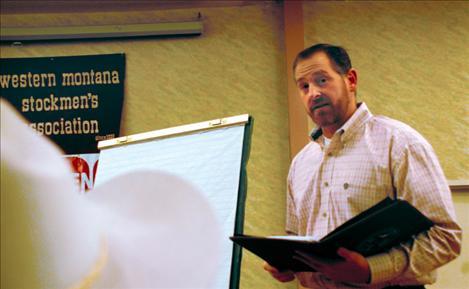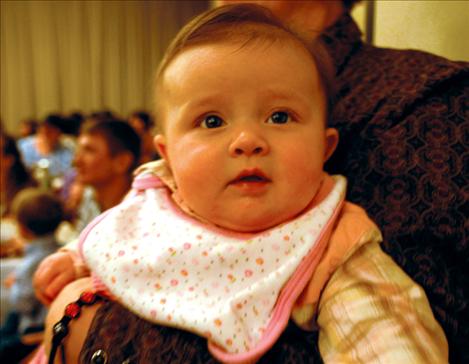Western Montana Stockgrowers meet, eat and socialize
Hey savvy news reader! Thanks for choosing local.
You are now reading
1 of 3 free articles.
POLSON — The lower floor of the KwaTuqNuk Resort and Casino was a sea of hats and boots as members of the Western Montana Stockgrowers Association gathered for their annual meeting Jan. 19.
Before a social hour, a prime rib dinner and dancing, the livestock producers held a business meeting at 2 p.m.
Among other business, the group voted to continue its public relations program of radio spots, put together by Joey Hennes, Northwest Farm Credit Services and director of the WMSA. So far, topics of the one-minute advertisements have been how to drive through a bunch of cows on the highway, feeding, noxious weeds, dogs running free and green ranching.
U.S. Department of Agriculture Wildlife Services supervising wildlife biologist Craig Glazier and wildlife specialist Ted North gave a wolf update.
There is no federal budget for wolf control; the state budget remains the same; and Montana Fish Wildlife and Parks contributes $110,000. Statewide, they’ve lost four specialists, Glazier said. Some counties have countered this by instituting a cattle petition, where growers agree to pay a per-head tax to support wolf control.
Mike Cuffe, R-House District 2, has sponsored a bill to add grizzly bears to the livestock loss board. It would take $200,000 out of the general fund for wolves and grizzly bears.
In an effort to make the WMSA more politically active, president Ken McAlpin passed around a sheet so people could sign up to go to Helena to testify and to make calls or emails to legislators.
“It’s a way to stay in touch with what’s going on (legislatively),” McAlpin said.
The protocol between Glazier, North and the FWP now allows them to verify wolf kills and take necessary steps without asking permission from FWP, “which is more efficient and more effective,” Glazier said.
Last year, producers in the association reported and verified livestock losses of $230,000 from wolves, $5,000 from coyotes, $26,000 from mountain lions, and $8,000 from bears, Glazier said. A total of 33 wolves were removed, and eight were collared.
Statewide, 104 wolves were harvested, with 52 trapped. Of those 52 wolves, 83 percent were trapped in Western Montana. Overall, Glazier said 67 percent of the wolf harvest was in Western Montana.
In Montana, the total wolf take was down.
“I think it was down due to loss of funding statewide,” Glazier said.
North noted the success he’d had controlling wolves “has a lot to do with your involvement. A lot of you guys put a lot of hours into checking traps.”
He also said stockgrowers let him know where they’ve seen wolves or tracks, etc.
“Local intel, the pilot calls it,” North explained.
Since North’s territory covers seven counties, he appreciates all the help he gets.
In other business, Tucker Hughes, Stanford rancher and president of the Montana Stockgrower’s Association, spoke to the stockmen.
As well as advising the growers to take the time to go to Helena to testify, make phone calls or email legislators on bills concerning them, Hughes said the state association’s goals are the protection of property rights; support for local control of bison; working on eminent domain with the legislature; senior water rights; and ways to adequately fund the State Department of Livestock.
First vice-president Gene Curry, Valier, talked about his experience with the compact for the Blackfeet tribe. This spurred questions about the Salish and Kootenai Tribes and the Reserved Water Rights Compact Commission.
The Flathead Indian Irrigation Project has proposed an agreement, and public meetings on the issue are scheduled this week. The FIIP proposal is a part of the larger proposed water compact, which contains a unitary administration and management ordinance.
Hughes and Curry touted “Big Sky Boots: Working Seasons of a Montana Cowboy,” a book produced by the state organization.
“If you know somebody in San Diego, New York or Tallahassee, let them see the true story of agriculture, not that video of a Holstein cow being rolled down the alley by a Bobcat,” Curry said, referring to a You-Tube video.
The members also heard a presentation from Gary Adams, ranch donor director for the Yellowstone Boys and Girls Ranch, gave a presentation on the ranch’s heifer project. The ranch near Billings is home to about 100 at-risk kids from Montana and Wyoming. At the ranch, they have an opportunity to work with cattle and horses.
“They don’t want anything to do with humans; humans are the ones who’ve made them like they are,” Adams said.
To help fund the program, the YBR’s heifer program asks ranchers to raise a calf from a heifer they provide. Then the YBR picks up the calf and brings it to their feedlot or the rancher sells the calf with their own calves, benefiting the YBR. A farmer can donate grain or hay.
“We’ll fit your program,” Adams said. “All you’ve got to do is take care of that animal.”
At the dinner following the business meeting and happy hour, Delene and Roy Tufly were honored with the WMSA’s lifetime achievement award.
When it disbanded two years ago, the cattlewomen’s association turned its substantial treasury over to WMSA, according to McAlpin. The group uses that money as a goodwill fund, to do something for a deserving person or organization. To replenish the fund, auctioneer Blake Nuffer, Montana Livestock Auction, sold a couple of throws featuring WMSA brands. Nuffer also sold other items, including a chair and a coat rack made by the YBR kids.
The Western Montana Stockgrower’s Association then donated $1,000 to YBR, in addition to the auction money.
About 300 people attended the dinner, according to Jack Stivers, executive secretary of the WMSA. The evening ended with dancing.















